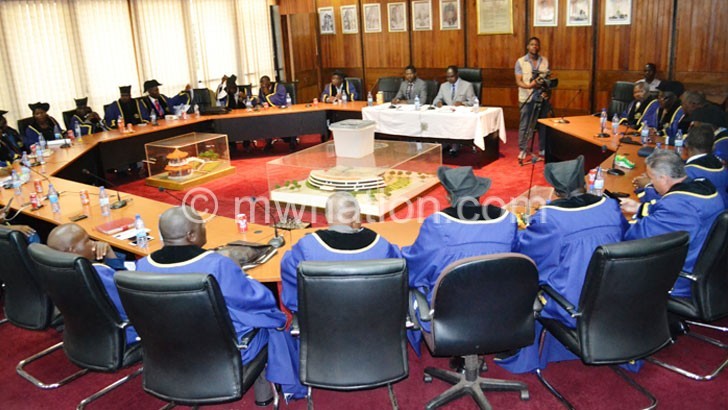Councillors meet end June
Newly elected councillors are expected to meet on June 25-–28 days after Malawi Electoral Commission (MEC) announced the Local Government Election results—for their first council meetings where, among others, they will elect mayors.
Ministry of Local Government and Rural Development spokesperson Muhlabase Mughogho said in an interview yesterday the first council meetings will be held after the 28-day period after the official announcement of the results.

The Local Government Act states in Section 7 (1) that members of the council shall at their first meeting elect, from among their member other than members ex officio a chairperson and a vice-chairperson.
Section 9 further states that the chairman and vice-chairman of a city or municipal council may have the title of mayor and deputy mayor, respectively.
Mughogho said the meeting is held 28 days after the official announcement to enable all councils conduct the first council meeting on the same day.
She said: “The ministry will also conduct orientation sessions with all council members and service committees the same day soon after the first council meeting.”
Meanwhile, University of Malawi’s Chancellor College political science professor Happy Kayuni has cautioned against the continued undermining of councillors’ role in development by members of Parliament (MPs).
He said while councillors are supposed to spearhead development at local level, MPs have assumed some of the roles.
Said Kayuni: “On paper, yes a councillor is key but in practice I don’t think I see councillors playing a key role in our democracy unless we significantly change in our perceptions and practices of MPs themselves.”
Kayuni’s position is echoed in a policy paper on the role of elected councillors as advocates of community participation in development under decentralisation, where authors Janet Olive Machinjiri, Jian Xiaoying and Justin Alinafe Mangulama point out that councillors play a vital role in as far as decentralisation reforms in the country are concerned.
However, the paper written in 2017, indicates that the structural problem existing is on the roles and responsibilities of councillors and MPs resulting in power struggles and conflicts.
In the just-ended May elections, the governing Democratic Progressive Party (DPP) has dominated the councils with a representation of 161 councillors followed by Malawi Congress Party (MCP) with 160 councillors.
Trailing the two parties are independent candidates at 74; UTM Party with 39 councillors; United Democratic Front (UDF) with 20 councillors; People’s Party (PP) with four councillors and Alliance for Democracy (Aford) with two councillors.
Based on the numbers, DPP might have a chance of having mayors in Blantyre and Zomba cities as well as Luchenza Municipality in Thyolo. UTM Party may likely take charge of Mzuzu City Council.
In Lilongwe and Kasungu Municipality, MCP stands a better chance as they have the most mayors affiliated to the party in those districts.
In an earlier interview, governance expert Henry Chingaipe, said it was highly likely that parties with more numbers will claim the leadership of respective councils.
There were about 2 615 candidates in the Local Government Elections race with independent contenders leading the pack at 831, representing 31 percent of the aspirants. DPP fielded 451; UTM had 417; MCP 403 and UDF 228.
The crop of ward councillors elected is the third cohort after similar elections in 2000 and 2014.





